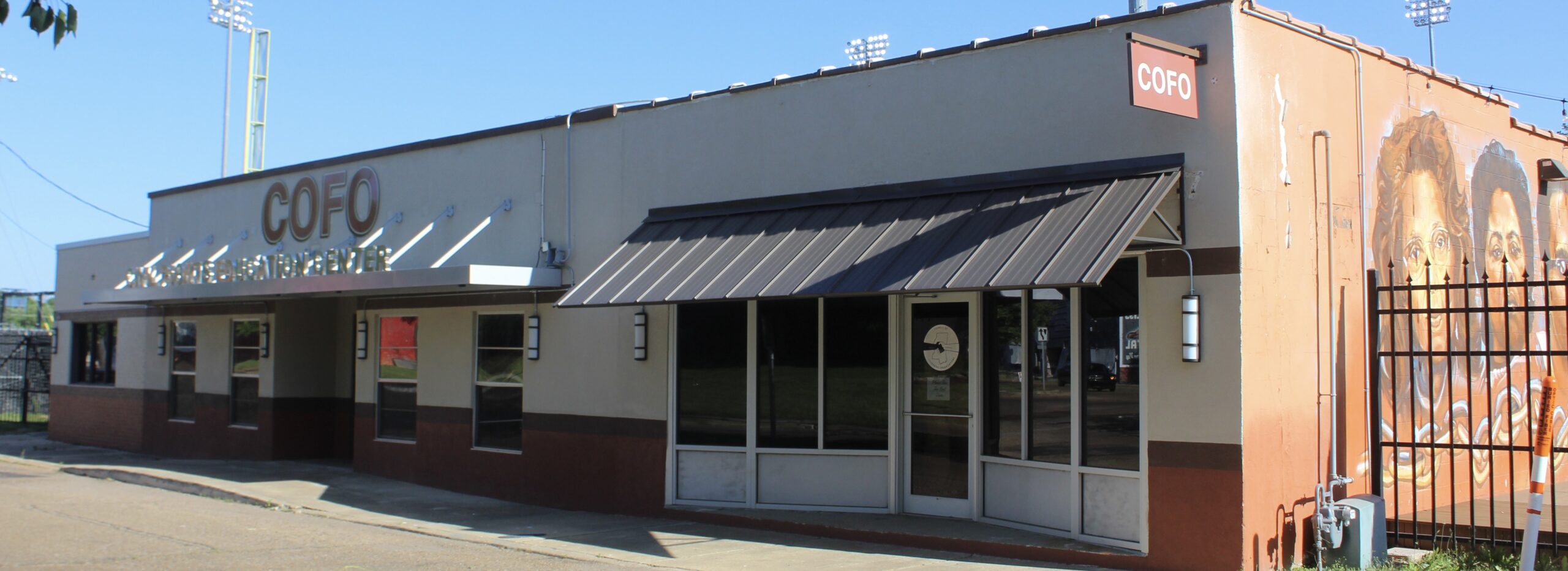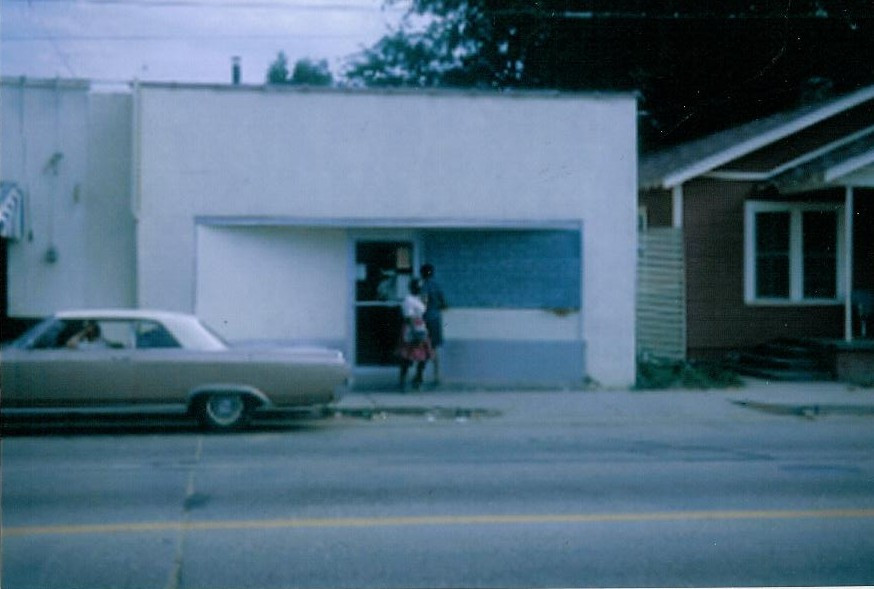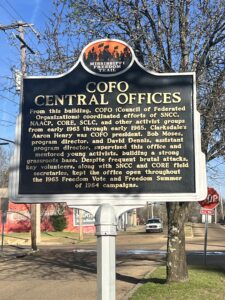COFO Civil Rights Education Center

History of COFO
In 1961, the Council of Federated Organizations (COFO) was established as an umbrella organization to unify and meet the needs of an increasing presence of civil rights organizations in Mississippi, including the Student Nonviolent Coordinating Committee (SNCC), the Congress of Racial Equality (CORE), the Southern Christian Leadership Conference (SCLC), the National Association for the Advancement of Colored People (NAACP), and a host of local civil rights organizations. For the first two years of operation, COFO centered its activities around voter registration throughout Mississippi and establishing targeted projects in hugely segregated towns such as Columbus, Greenville, Greenwood, Hattiesburg, Holly Springs, and Meridian. In 1963, COFO established its state headquarters in Jackson, Mississippi, at 1017 John R. Lynch Street—a corridor of black businesses and activism at the time—on the edge of the Jackson State campus.

The location was ideal to attract and nurture community and student involvement in the movement. For decades the street was home to Jackson State College (now Jackson State University), Campbell College, the historic Masonic Temple, which housed the offices of the NAACP field secretary Medgar Evers, and a number of African American businesses including restaurants, dry cleaners, barbershops, a theater, and drugstore. Lynch Street was the cradle of civil rights activity in Jackson, and the neighborhood witnessed numerous protests, marches, mass meetings, and demonstrations. The activities on Lynch Street did not go unnoticed by police, who often took the license plate numbers from cars parked at the Masonic Temple for further surveillance of civil rights workers.
COFO established major programs in its short life span on Lynch Street and became the hub of civil rights activity for the region. The most recognized campaign initiated by COFO was the Mississippi Summer Project of 1964—known as Freedom Summer—where masses of mostly white college students from the northern states traveled to Mississippi to participate in voter registration efforts throughout the state and establish freedom schools and community centers. This effort was perceived as an assault on the “way of life” by many white Mississippians. As a result, there were dozens of church bombings, countless beatings of civil rights workers, and the tragic killing of James Chaney, Andrew Goodman, and Michael Schwerner in Philadelphia, Mississippi, during the summer of 1964. The murders received more national press coverage than any other civil rights murders at the time. A year before the Chaney-Goodman-Schwerner murders, Medgar Evers was assassinated in his driveway in Jackson.
The Mississippi Freedom Democratic Party (MFDP) was also an outgrowth of COFO’s Freedom Vote efforts. The MFDP was organized to offer accessible elections since African Americans were denied the right to vote. Nearly 80,000 African Americans cast their ballots in the 1963 Freedom Vote, and consequently, the MFDP formed in April 1964. The MFDP sent its elected delegates to the Democratic National Convention held in New Jersey to challenge the all-white “Regulars” of the Mississippi Democratic Party, who had been elected without the will and consent of Black Mississippians. The MFDP delegates asked to be seated at the Convention as the only democratically elected delegation from the state.
Among the 64 MFDP delegates were Fannie Lou Hamer, Aaron Henry, and Ed King. The MFDP gained considerable support as they argued their case, enough to be offered a compromise of two seats out of the 64 needed to seat the entire delegation. In her famous televised speech, Fannie Lou Hamer expressed the attitude of the MFDP stating, “We didn’t come all the way up here for no two seats since we all tired.” President Lyndon B. Johnson interrupted her speech by calling an immediate press conference. This event in modern civil rights history can be considered a turning point in the movement. After years of organizing and being subjected to brutality and deaths, it became apparent that even the White House was not as supportive as it had preached and soon afterwards the Black Power movement emerged.
The modern civil rights struggle in Mississippi has been overlooked for quite some time, but recent scholarship and the interests in Mississippi have been peaked partly due to the number of 50th and now 60th anniversaries celebrating civil rights movement history. James Meredith integrated the University of Mississippi in 1962. Medgar Evers was assassinated in 1963. Freedom Summer came in 1964, and, in 1966, the historic call for Black Power was first made in Greenwood, Mississippi.
In 2011, the COFO Civil Rights Education Center opened to honor the past, deal with issues of the present, and offer hope for the future in the same building as the original Council of Federated Organizations. On the State Register of Historic Places, the building has its original façade, which pays homage to its uses during the civil rights era. It sits on the Mississippi Freedom Trail, and educational exhibits have been developed inside.
Even though many books have been published on the Mississippi civil rights movement, scholars from around the world visit the state in search of people, documents, artifacts, and historic sites. This interest has presented opportunities for the COFO Civil Rights Education Center to provide the requisite collections, archives, and space for researchers to engage the history of the Mississippi civil rights movement.

The COFO Center has developed and delivered educational programs to increase student, faculty, staff, and community visitation and program participation. These programs have been implemented through collaborative efforts with the College of Liberal Arts, the Division of Student Life, the Margaret Walker Center, and community organizations that include the Malcolm X Grassroots Movement, Mississippi State Conference of the NAACP, Mississippi Student Justice Alliance, Southern Poverty Law Center, Upward Bound, McNair Scholars Program, ExCel Program, Veterans of the Mississippi Civil Rights Movement, the Equal Justice Initiative, the Young People’s Project, and a host of others.
Additionally, COFO has hosted opportunities for University recruitment at Jackson State with visits from middle school and high school students through educational enrichment trips and off campus tours. COFO’s outreach through its programming has helped to enhance the branding and visibility of the University, locally, nationally, and globally. Programs have not only impacted the University and local communities, they have presented opportunities for visitors from across the nation and from around the world to join in conversations on social justice and cultural understanding. Newly forged community partnerships have helped to increase University supporters and have created additional opportunities for collaborations between students, faculty and staff at other institutions of higher education.
COFO’s mission remains relevant and significant to a 21st century liberal arts education in a global context. By creating the COFO Center, JSU—as a historically black university—is committed to preserving the history and legacy of the Mississippi civil rights movement and expanding a regional perspective to include global perspectives, programs, and educational offerings that address human rights and social justice issues from around the world. COFO represents a living history and can affect change in a real and substantive way through community outreach, programming, and exhibitions at home and abroad.

